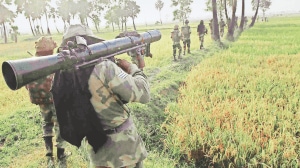Wiretap tapes could have brought AI accused to justice: Witness
The Air India bombers could have been brought to justice years ago if Canada's spy agency hadn't erased key wiretap tapes, a top cop said.

The Air India bombers could have been brought to justice years ago if Canada’s spy agency hadn’t erased key wiretap tapes, a top police officer said.
Royal Canadian Mounted Police (RCMP) Deputy Commissioner Gary Bass on Monday testified before a public inquiry into the June 23, 1985 attack that he’s convinced the missing material could have been used to build a “conspiracy case” against the Sikh extremists suspected in the blast that killed 329 people.
“I certainly would have been urging a prosecution,” he said.
“I think there probably would have been an opportunity for a court to accept that (wiretap material) as proof of a conspiracy. I can’t say for sure, obviously. But to me it would be fairly compelling evidence to put forward to Crown (government) counsel.”
At issue are hundreds of hours of wiretaps conducted by Canadian Security Intelligence Service (CSIS) in the months just before and after the bombing of the Kanishka plane.
Though written summaries of the contents were kept, the originals were erased in keeping with standard service policy.
A 1992 study by the Security Intelligence Review Committee, the watchdog that monitors CSIS, was critical of the erasures but concluded it was unlikely that any critical evidence was lost.
Bass, then the RCMP inspector in-charge of the Air India investigation, first challenged that finding in a memo written in 1996, and later widely publicised.
“There is a strong likelihood that, had CSIS retained the tapes between March and August 1985, a successful prosecution against at least some of the principals (in the bombing) could have been undertaken,” the officer wrote.
The comments have often been cited as an example of the turf wars between the RCMP and CSIS that hampered the investigation.
But Bass insisted on Monday he wasn’t trying to point any fingers at the spy service. In other memos, he acknowledged the Mounties could also be criticised for their own investigative efforts.
“I think we all share in the responsibility — both of us, the RCMP and CSIS — to co-operate and work closely together to the benefit of Canadians,” he said.
“I don’t think either of us did particularly well at that in 1985.”
Bass also told the inquiry, headed by former Supreme Court justice John Major, that a key point of his 1996 memo was to set the record straight following the earlier report by the Security Intelligence Review Committee.
He maintained the review panel was wrong when it accepted the word of CSIS on some key questions related to the erasures. But when Major asked whether he thought the spy agency had lied to the committee, Bass pulled back.
“I wouldn’t go so strong as to say it was a lie,” he said. “It could be misinterpretation.”



- 01
- 02
- 03
- 04
- 05




























